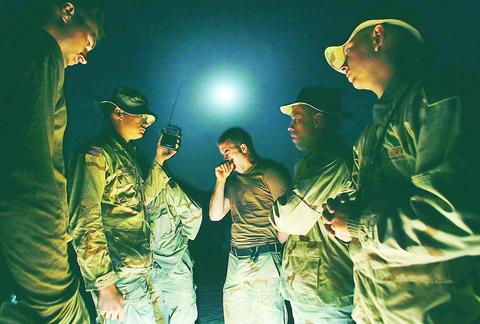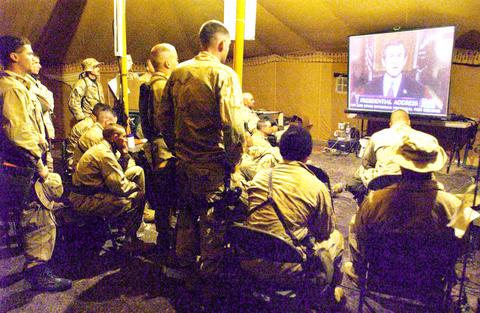In a countdown toward war, President George W. Bush is ready to order a massive military strike against Iraq if Saddam Hussein refuses to surrender power by a deadline of 1am GMT ( 9am Taiwan time) tomorrow. Wary of retaliation, Bush braced Americans for possible terrorist attacks.
Yesterday, Iraq's leadership rejected Bush's ultimatum. Iraqi television said the decision was made in a joint meeting of the Revolution Command Council -- Iraq's highest executive body -- and the leadership of the ruling Baath party. Saddam chaired the meeting, it said.
Bush, in a prime-time speech Monday night, vowed to strike Iraq with "the full force and might" of the US military unless Saddam and his two sons leave Iraq within 48 hours. More than 250,000 American forces are poised for action in the Gulf. "The tyrant will soon be gone," the president pledged

PHOTO: AP
Having abandoned diplomacy at the stubbornly divided UN Security Council, Bush set about trying to win over an equally divided American public. A CNN-USA Today-Gallup poll found Americans just about evenly split on whether the United States should unleash military action without a new UN vote. Forty-seven percent supported such an action and 50 percent opposed it.
In Geneva a group of international jurists said yesterday that any US-led attack on Iraq was illegal without UN Security Council backing.
"In the absence of such Security Council authorization, no country may use force against another country, except in self-defense against armed attack," the Geneva-based International Commission of Jurists (ICJ) said.

PHOTO: AFP
"This rule was enshrined in the United Nations Charter in 1946 for a good reason: to prevent states from using force as they felt so inclined," said ICJ Secretary-General Louise Doswald-Beck in a statement.
Washington and its main allies, Britain and Spain say resolution 1441, warning of "serious consequences" if Iraq did not disarm, give sufficient grounds.
But the ICJ, a group of 60 eminent international legal experts, said resolution 1441, approved last November, was not enough, particularly as three permanent members of the Security Council -- France, Russia and China -- issued a statement at the time spelling this out.
Indonesia, the world's most populous Muslim nation, lamented the breakdown of diplomacy, as did India, France and Mexico.
Japan supported the US position. "It was a decision that had to be made," Prime Minister Junichiro Koizumi said.
German Chancellor Gerhard Schroeder had the opposite view.
"Does the threat posed by the Iraqi dictator justify a war, which is sure to kill thousands of innocent children, women and men? My answer in this case was and is: No," Schroeder said.
French President Jacques Chirac said a war without the support of the UN would undermine future efforts at peaceful disarmament. France led an effort to give UN weapons inspectors in Iraq more time to uncover banned weapons.
"To act without the legitimacy of the UN, to favor the use of force over law, is taking a heavy responsibility," Chirac said.
At the Vatican, which is against war in Iraq, spokesman Joaquin Navarro-Valls said "whoever decides that all peaceful means available under international law are exhausted assumes a grave responsibility before God, his own conscience and history."
In Tokyo, Koizumi described the ultimatum as "a very difficult decision" for Bush and reiterated his government's position that there was no need for a new UN resolution authorizing an attack.
Japan's constitution bars its armed forces from fighting in foreign wars, but Koizumi's government reportedly was considering humanitarian missions.
China's new premier called for "every effort" to avoid a conflict and said that UN weapons inspections must continue even as he acknowledged that the situation appeared dire.
"The arrow has already been placed on the bow," said Wen Jiabao in a speech on his second full day as China's prime minister. "As long as there is one glimmer of hope, we will not give up our efforts for a peaceful settlement."
In Mexico City, President Vicente Fox said that he regrets that the conflict appears headed for war, but that his nation's opposition to military action would not strain relations with the US.
Mexico, a member of the UN Security Council, had struggled with its position on Iraq, as Fox walked a fine line between offending voters at home who overwhelmingly oppose war and antagonizing the US, which accounts for about 75 percent of Mexico's trade.
"We maintain our belief that the diplomatic means to achieving (the goal) have not been exhausted," Fox said.
In Indonesia, a government spokesman lamented the apparent breakdown of diplomacy. "We still believe that a solution to the crisis should be found within the UN Security Council," spokesman Marty Natalegawa said.
Outside Jakarta's main mosque an Islamic activist made a dire warning.
"Don't blame the Muslims if the coming war in Iraq gives birth to thousands of new Osama bin Ladens," said Habib Rizieq Shihab of the Islamic Defenders Front.
The countdown to war has raised the prospect of a backlash by Muslims in Indonesia and Malaysia, making it difficult to crack down on radical groups.
"I don't understand how someone can want war like Bush does," said Srisu Sapti, a maid in Jakarta. "Women and children will be killed."
In New Zealand, Prime Minister Helen Clark said it was "highly debatable" whether a US-led strike on Iraq would be justified under international law.
India issued a veiled criticism of US unilateralism, while Pakistan planned an emergency session of Parliament today to discuss Iraq.

RESPONSE: The transit sends a message that China’s alignment with other countries would not deter the West from defending freedom of navigation, an academic said Canadian frigate the Ville de Quebec and Australian guided-missile destroyer the Brisbane transited the Taiwan Strait yesterday morning, the first time the two nations have conducted a joint freedom of navigation operation. The Canadian and Australian militaries did not immediately respond to requests for comment. The Ministry of National Defense declined to confirm the passage, saying only that Taiwan’s armed forces had deployed surveillance and reconnaissance assets, along with warships and combat aircraft, to safeguard security across the Strait. The two vessels were observed transiting northward along the eastern side of the Taiwan Strait’s median line, with Japan being their most likely destination,

‘NOT ALONE’: A Taiwan Strait war would disrupt global trade routes, and could spark a worldwide crisis, so a powerful US presence is needed as a deterrence, a US senator said US Senator Deb Fischer on Thursday urged her colleagues in the US Congress to deepen Washington’s cooperation with Taiwan and other Indo-Pacific partners to contain the global security threat from China. Fischer and other lawmakers recently returned from an official trip to the Indo-Pacific region, where they toured US military bases in Hawaii and Guam, and visited leaders, including President William Lai (賴清德). The trip underscored the reality that the world is undergoing turmoil, and maintaining a free and open Indo-Pacific region is crucial to the security interests of the US and its partners, she said. Her visit to Taiwan demonstrated ways the

GLOBAL ISSUE: If China annexes Taiwan, ‘it will not stop its expansion there, as it only becomes stronger and has more force to expand further,’ the president said China’s military and diplomatic expansion is not a sole issue for Taiwan, but one that risks world peace, President William Lai (賴清德) said yesterday, adding that Taiwan would stand with the alliance of democratic countries to preserve peace through deterrence. Lai made the remark in an exclusive interview with the Chinese-language Liberty Times (sister paper of the Taipei Times). “China is strategically pushing forward to change the international order,” Lai said, adding that China established the Asia Infrastructure Investment Bank, launched the Belt and Road Initiative, and pushed for yuan internationalization, because it wants to replace the democratic rules-based international

RELEASED: Ko emerged from a courthouse before about 700 supporters, describing his year in custody as a period of ‘suffering’ and vowed to ‘not surrender’ Former Taiwan People’s Party (TPP) chairman Ko Wen-je (柯文哲) was released on NT$70 million (US$2.29 million) bail yesterday, bringing an end to his year-long incommunicado detention as he awaits trial on corruption charges. Under the conditions set by the Taipei District Court on Friday, Ko must remain at a registered address, wear a GPS-enabled ankle monitor and is prohibited from leaving the country. He is also barred from contacting codefendants or witnesses. After Ko’s wife, Peggy Chen (陳佩琪), posted bail, Ko was transported from the Taipei Detention Center to the Taipei District Court at 12:20pm, where he was fitted with the tracking